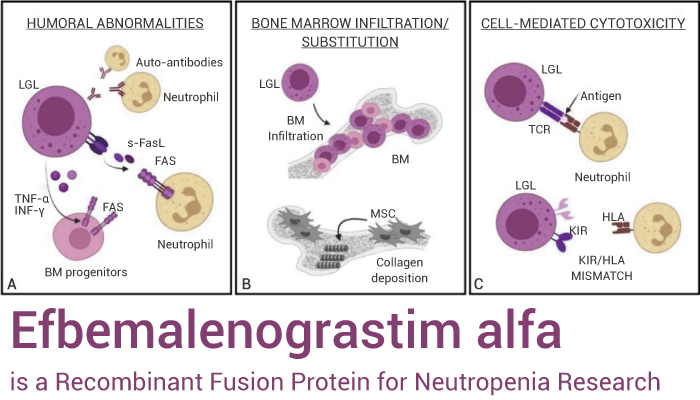Neutropenia is usually caused by the myelosuppressive chemotherapy, and along with severe neutropenia. Meanwhile, G-CSF is a hormone that stimulates the production, differentiation, proliferation and activation of neutrophils from the bone marrow into the blood circulation. Therefore, recombinant G-CSF proteins are potential agents for prevention of chemotherapy-induced neutropenia. Noticeably, Efbemalenograstim alfa (F 627), a recombinant fusion protein, is a long acting dimeric G-CSF that contains two human G-CSF fused to a hIgG2-Fc fragment. Moreover, Efbemalenograstim alfa induces white blood cells production. Recently, FDA approved Efbemalenograstim alfa (RyzneutaTM) for treatment of chemotherapy-induced neutropenia.
Efbemalenograstim alfa, a dimeric rhG-CSF Fc fusion protein, can be used for neutropenia research.
In vitro, Efbemalenograstim alfa can bind to G-CSF receptor, and stimulates the survival, proliferation, differentiation and function of neutrophil precursors, as well as mature neutrophils. For example, Efbemalenograstim alfa activates STAT3, and stimulates the proliferation of 32D-GCSFR and M-NSF60 cell lines.
In vivo, in a Cyclophosphamide (i.v., 60 mg/kg on day 0 and 65 mg/kg on day 1)-treated monkey model, Efbemalenograstim alfa (25-150 μg/kg, on day 5 and day 10) increases neutrophil count. Therefore, Efbemalenograstim alfa is potent in preventing severe neutropenia.
In conclusion, Efbemalenograstim alfa is a long-acting dimeric rhG-CSF Fc fusion protein, and for can be used for the prevention of chemotherapy-induced neutropenia.
References:
[1] Blair HA. Drugs. 2023 Aug;83(12):1125-1130.
[2] William Daley, et, al. Cancer Res (2022) 82 (4_Supplement): P5-16-14.
[3] Zheng Tao Hu, et al. Blood. 116 (21), 2010, 1485.
